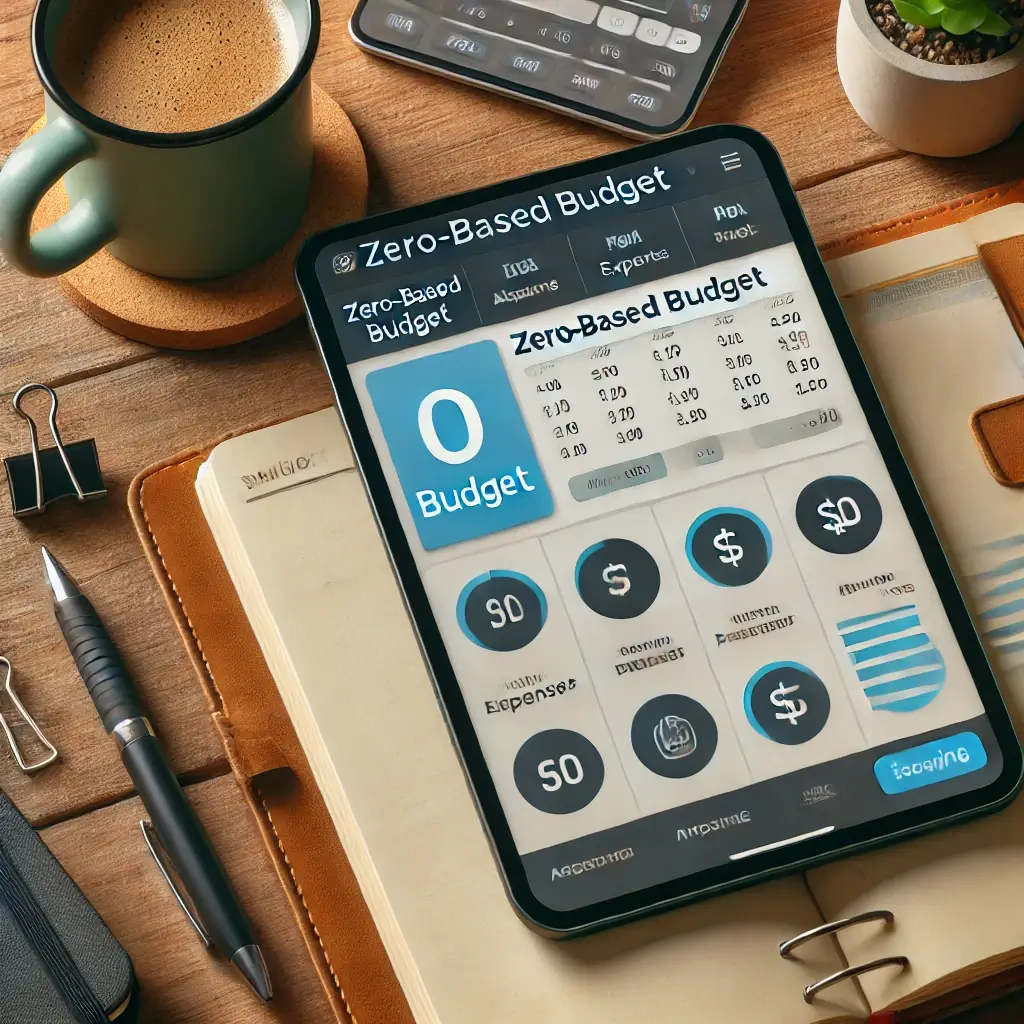Managing your finances efficiently can seem daunting, especially when you’re juggling multiple expenses and income sources. One highly effective method to take full control of your money is Zero-Based Budgeting. This approach is more detailed than traditional budgeting, as it requires you to justify every expense and allocate every dollar of your income. In this comprehensive guide, we’ll walk you through what Zero-Based Budgeting is, how to implement it, its advantages and disadvantages, and practical tips to maximize your financial success.
What Is Zero-Based Budgeting?
- Definition: Zero-Based Budgeting (ZBB) is a budgeting method where your income minus your expenses equals zero. Unlike traditional budgeting, which often involves rolling over unallocated money, Zero-Based Budgeting ensures every dollar you earn is assigned a specific purpose.
- How It Works: At the start of each month, you calculate your total income and then allocate every dollar to a specific category—such as rent, groceries, savings, or debt repayment—until your budget balances to zero.
- Example: If your monthly income is $3,000, you need to assign all $3,000 to various expenses and financial goals. By the end, your total expenses should equal $3,000, leaving no unallocated money.
Key Concept: “Zero” doesn’t mean you have no money left; it simply means every dollar is accounted for and serves a purpose.
How to Implement Zero-Based Budgeting
- Step 1: Calculate Your Monthly Income
Begin by identifying all your income sources for the month. This includes your salary, freelance income, side hustles, or any other revenue streams.- Tip: Use your net income (after taxes) for accurate budgeting.
- Step 2: List All Your Expenses
Write down every expense you expect to incur, including fixed expenses (like rent and utilities), variable expenses (like groceries and gas), and discretionary spending (like entertainment and dining out).- Categories to Consider: Housing, utilities, groceries, transportation, debt repayment, savings, insurance, healthcare, and miscellaneous expenses.
- Step 3: Assign Every Dollar a Job
Allocate your income to each expense category. Keep adjusting until every dollar has a job, and your income minus expenses equals zero.- Example: If you have $200 left after covering all expenses, decide whether to add it to your savings or debt repayment.
- Step 4: Track Your Spending
Throughout the month, monitor your spending to ensure you’re sticking to your budget. Adjust as needed if unexpected expenses arise. - Step 5: Review and Adjust Monthly
At the end of each month, review your budget, analyze what worked and what didn’t, and make adjustments for the next month.
Tools to Use: Budgeting apps like YNAB (You Need a Budget) or EveryDollar are specifically designed for Zero-Based Budgeting and make tracking easier.

The Advantages of Zero-Based Budgeting
- 1. Full Control Over Your Money
With Zero-Based Budgeting, you know exactly where every dollar goes. This control helps prevent wasteful spending and allows you to focus on financial goals, like paying off debt or saving for a home. - 2. Improved Financial Awareness
The method forces you to analyze your spending habits, which often reveals areas where you can cut back. Over time, this awareness can lead to smarter financial decisions. - 3. Prioritization of Goals
By assigning money to categories like savings and debt repayment first, you’re prioritizing what’s most important. This structured approach can accelerate your financial progress. - 4. Flexibility and Customization
Zero-Based Budgeting is highly flexible. If your financial situation changes, you can easily adjust your budget to reflect new income or expenses.
Benefit: The method encourages a proactive rather than reactive approach to money management, which can lead to long-term financial success.
The Disadvantages of Zero Based Budgeting
- 1. Time-Consuming
Setting up a Zero-Based Budget requires more effort and time compared to simpler budgeting methods. Each dollar needs to be allocated, which can feel tedious, especially for beginners. - 2. Requires Consistent Tracking
To make Zero-Based Budgeting work, you must track your spending consistently. Falling behind can lead to overspending and derail your financial plan. - 3. Can Be Restrictive
For some, the method may feel too rigid. If you enjoy spontaneous purchases, sticking to a Zero-Based Budget can be challenging.
Drawback: The need for constant adjustments can be stressful if your income fluctuates frequently.
Who Should Use Zero-Based Budgeting?
- Best For People who want complete control over their finances, have specific financial goals, or need a disciplined approach to money management. It’s especially effective for those looking to pay off debt quickly or save aggressively.
- May Not Be Ideal For: Individuals with highly variable income may find the method challenging to implement. In such cases, a hybrid approach that incorporates elements of Zero-Based Budgeting might be more suitable.
Example: If you’re a freelancer, consider allocating a portion of high-earning months to a buffer fund, making it easier to stick to a Zero-Based Budget.
Practical Tips for Successful Zero-Based Budgeting
- 1. Use Budgeting Apps
Apps like YNAB or EveryDollar simplify the process by automatically tracking your spending and helping you allocate funds efficiently. For more details concerning such apps, see our guide Best Expense Tracking Apps for Budgeting. - 2. Automate Payments Where Possible
Automate essential payments, like rent or insurance, to avoid missing due dates. This also frees up mental space for tracking variable expenses. - 3. Build an Emergency Fund
Having an emergency fund is crucial when using Zero-Based Budgeting. It provides a safety net for unexpected expenses, like car repairs or medical bills, without derailing your budget. - 4. Review Your Budget Regularly
Make it a habit to review your budget at the end of each month. This practice helps you identify areas for improvement and ensures you’re on track to meet your financial goals.
Final Tip: Stay flexible. Even with a Zero-Based Budget, life happens. Be prepared to reallocate funds as needed, and don’t be too hard on yourself if things don’t go perfectly.
Conclusion
Zero-Based Budgeting is a powerful financial tool that offers complete control over your money. By assigning every dollar a job, you ensure your income is working for you, whether it’s paying down debt, saving for the future, or covering essential expenses. While it requires time and effort to implement, the rewards can be substantial, especially for those serious about reaching their financial goals. If you’re ready to take charge of your finances, give Zero-Based Budgeting a try and see the difference it makes.
Understanding different budgeting methods can help you manage your finances more effectively. Learn the key differences and benefits of each approach in our detailed guide on Comparing Incremental and Zero-Based Budgeting.
